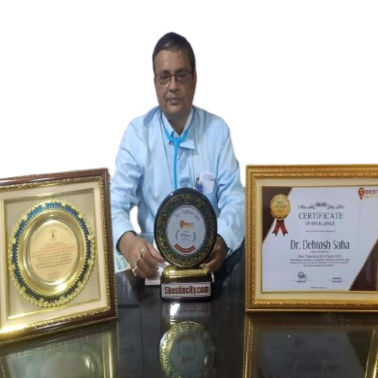Diabetes in India: Causes, Effects, and Prevention Strategies
Explore the alarming rise of diabetes in India, its causes, effects, and strategies for prevention. Learn how public-private efforts and technological advancements are shaping diabetes care in the nation.

Written by
Last updated on 3rd Jul, 2025
Diabetes, a chronic metabolic disorder characterised by elevated blood sugar levels, is a major global health challenge. It is classified into three types: Type 1, Type 2, and gestational diabetes.
In India, rising urbanisation and lifestyle changes have led to an alarming increase in diabetes prevalence, necessitating urgent action to address this growing health crisis. This blog outlines the causes, effects, and prevention strategies for diabetes in India.
Current Scenario of Diabetes in India
India is considered to be the ‘diabetes capital of the world’ because it is filled with alarming statistics that indicate the seriousness of the situation.
Currently, 77 million adults have diabetes, and the occurrence has increased markedly in the last few decades.
An estimate shows that by 2045, this number might rise to 134 million, and the public health issues will be insurmountable.
Diabetes is a global concern, but its rise in India is significantly higher compared to many other countries.
Developing nations, including India, are experiencing a steady increase in diabetes prevalence among their populations.
The situation is worsened by limited access to healthcare in rural areas. A lack of awareness about diabetes further aggravates the problem.
Causes and Risk Factors of Diabetes in India
The rise in diabetes in India can be attributed to a combination of genetic, lifestyle, and socioeconomic factors.
Indians are genetically predisposed to insulin resistance, which heightens their risk of developing Type 2 diabetes. This genetic vulnerability is exacerbated by the rapid pace of urbanisation.
Dietary habits significantly contribute to the diabetes epidemic, particularly the shift towards a Westernised diet high in refined carbohydrates, sugars, and unhealthy fats. Coupled with technological advancements and urbanisation, increasingly sedentary lifestyles further worsen the issue.
Socioeconomic factors also play a critical role. Income disparities and limited access to healthcare among the rural population lead to unhealthy diets and increased susceptibility to obesity and diabetes.
Effects of Urbanisation and Industrialisation on Diabetes
Urbanisation and industrialisation have drastically transformed food systems and lifestyles in India, significantly contributing to diabetes.
The proliferation of fast food outlets has led to a rise in the consumption of processed foods, replacing healthier traditional diets. Additionally, urban living often promotes a more sedentary lifestyle with reduced physical activity.
Key factors such as high-stress levels from modern work culture, irregular sleep patterns, and a lack of exercise further exacerbate the risk of developing diabetes in this changing environment.
Public Health and Economic Aspects
Diabetes places a heavy strain on India’s healthcare system and national economy.
Managing diabetes and its complications, such as cardiovascular and kidney diseases, requires significant healthcare resources.
Public hospitals, often underfunded and understaffed, are struggling to cope with the growing demand for care.
The high costs of treatment and medication are further increased by productivity losses, as individuals with diabetes may face work-related disabilities, limiting their ability to contribute effectively to the economy.
Additionally, families bear indirect financial burdens, including caregiving responsibilities and lifestyle adjustments, which can deepen financial distress over time.
Government Initiatives and Private Efforts
Diabetes control efforts in the country employ joint government programs and private sector offerings.
The Government of India actively supports welfare initiatives such as the National Programme for Prevention and Control of Cancer, Diabetes, Cardiovascular Diseases, and Stroke (NPCDCS).
This programme promotes awareness, facilitates early diagnosis, and ensures access to affordable treatments for diabetes and related conditions.
Recent policies also focus on integrating diabetes care into primary healthcare services to enhance accessibility.
Non-governmental organisations (NGOs) and private agencies complement government efforts by organising community education programmes, screening camps, and introducing innovative service delivery models in remote areas.
Collaborative ventures between private healthcare providers and technology companies are also developing advanced solutions to improve diabetes care and management.
Technological and Medical Advancements
Advancements in technology and medical innovation offer promising opportunities for improved diabetes management.
Continuous glucose monitors and mobile health apps are transforming care by aiding better disease control.
Artificial intelligence helps predict risks and personalise treatments with greater precision.
Efforts to make medications like insulin more affordable are growing. Local production in India is lowering costs and ensuring a steady supply.
Telemedicine is also expanding access to healthcare, especially in rural areas, making quality care more reachable.
Strategies for Diabetes Prevention and Education
Preventing diabetes requires a multi-pronged approach, emphasising early diagnosis and lifestyle changes.
Early detection prevents complications and improves quality of life.
Educational schemes to create awareness about risk factors and symptoms related to diabetes are extremely important in the fight against the disease.
School-based initiatives help enforce healthy habits from an early age, thus addressing the root cause of the disease.
Community-based initiatives concerning healthy eating, active lifestyle, and stress reduction can lower diabetes risk.
Most often, collective participation in programs yields better results. An approach is workplace wellness programs focusing on physical activities and diet education.
Future Directions and Research
Ongoing research and policy reforms hold the potential to transform diabetes care in India.
Advances in personalised medicine, gene therapy, and new drug formulations are likely to shape the future of treatment.
Indian researchers are also exploring traditional medical systems like Ayurveda for innovative solutions.
Collaborations among academic institutions, healthcare providers, and pharmaceutical companies are driving the development of locally tailored treatment methods.
Policy reforms must strengthen healthcare infrastructure, boost funding for non-communicable diseases, and integrate technology into public health.
Universal health initiatives should ensure equal access to diabetes care, making treatment affordable and inclusive for all.
Conclusion
The alarming rise in diabetes cases in India calls for urgent collective action. Addressing its causes, impacts, and management strategies requires a nationwide focus on both the health and economic challenges posed by the disease.
Encouraging progress through public-private partnerships and emerging technologies offers hope that India can reverse current trends and move towards a healthier population.
Consult Top Diabetologist
Consult Top Diabetologist

Dr. Suraja Nutulapati
General Physician/ Internal Medicine Specialist
10 Years • MBBS, MD (Internal Medicine)
Hyderabad
Apollo 24|7 Clinic, Hyderabad
(850+ Patients)

Dr. Liritha C
General Physician/ Internal Medicine Specialist
5 Years • MBBS, MD (GENERAL MEDICINE)
Hyderabad
Apollo 24|7 Clinic, Hyderabad

Dr. Lakshmi Sanjitha Kakani
General Physician/ Internal Medicine Specialist
6 Years • MBBS, MD (General Medicine)
Visakhapatnam
Apollo 24|7 Clinic - Andhra Pradesh, Visakhapatnam

Dr. Debtosh Saha
General Physician/ Internal Medicine Specialist
31 Years • MBBS, Masterclass in Diabetes Complication, PG Diploma in Endocrinology & Diabetes, DCMH
Paschim Bardhaman
Dr Saha's Sugar & Mind Clinic, Paschim Bardhaman
(75+ Patients)

Dr. Bhaskar Mukhopadhyay
Diabetologist
20 Years • MBBS DNB RCGP PGCC
Kolkata
MEDICURE, Kolkata
